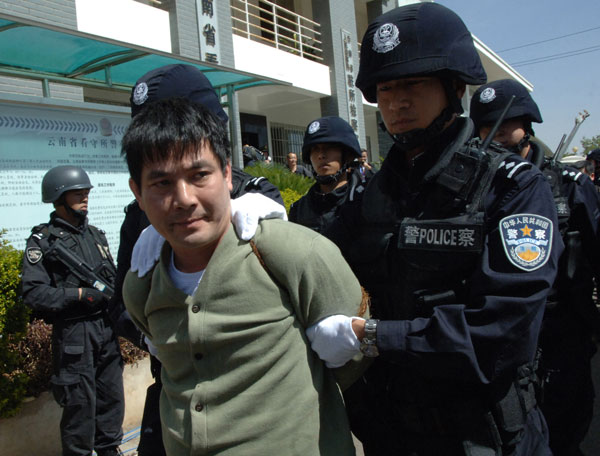Drug lord and 3 accomplices executed
Updated: 2013-03-02 08:21
By Xu Wei in Kunming (China Daily)
|
||||||||
The execution of Myanmar drug lord Naw Kham and his three accomplices on Friday, for the 2011 murder of 13 Chinese sailors on the Mekong River, is far from the end of the suffering for some of the families of the victims, who are now seeking compensation and justice to be served on others involved in the massacre.
Kham was executed on Friday afternoon along with Hsang Kham, Yi Lai and Zha Xiha by lethal injection in Kunming, the capital of Yunnan province, the Intermediate People's Court of Kunming said.
 |
|
Drug lord Naw Kham, from Myanmar, is escorted to an execution room in Kunming, Yunnan province, on Friday. Zhao Haolin / for China Daily |
Nine Thai soldiers accused of colluding with Naw Kham and his gang are still to stand trial after spending 17 months in detention, while Thai police gather evidence against them.
According to Thai law, soldiers cannot be extradited.
Zhang Xing, a lawyer for the relatives of Yang Deyi, the murdered captain of the ship that was attacked, said the family will take civil action against the Thai soldiers and seek compensation.
Wen Daixian, Yang's wife who also lost her son and brother in the attack, declined an interview request on Thursday, but Zhang said the family had already started filing the necessary documents to travel to Thailand and are expected to leave this month.
Meanwhile, concern remains over the safety of Chinese cargo vessels, their crew and others using the Mekong River, which runs through China's Yunnan province, Myanmar, Laos and Thailand.
"The core issue is the planting, making and trafficking of drugs in the region, which is a breeding ground for crime," said Han Xuguang, deputy director at the intelligence center of the narcotics control department of the Ministry of Public Security. "If the drug issue is not solved, similar drug gangs might emerge."
Wu Ruzhen, a liaison officer from the Ministry of Public Security at the Chinese embassy in Myanmar, added that the amount of land being used to grow drugs in the area remains the same now as it was last year.
In an interview with China Central Television before his execution, Kham had warned "good people" from traveling to the region.
"The region can turn good people into bad people. A good person could not resist the temptations in the area and get involved in drug dealing and gambling.
"After they lose their money gambling, they resort to drug dealing," he said through a translator.
He said he had been unable to sleep for two days and was missing his mother, wife and family.
"I hope my children will not be like me. I hope they will receive a good education and get a job," he said.
Song Qingrun, a Myanmar studies researcher with the China Institute of Contemporary International Relations, said he thought the executions should reduce the safety fears of travelers on the Mekong River.
"However, we can never exclude the possibility that there will be gangsters that target passengers and cargo on the river" he said.
Guo Anfei in Kunming contributed to this story.
xuwei@chinadaily.com.cn

 Li Na on Time cover, makes influential 100 list
Li Na on Time cover, makes influential 100 list
 FBI releases photos of 2 Boston bombings suspects
FBI releases photos of 2 Boston bombings suspects
 World's wackiest hairstyles
World's wackiest hairstyles
 Sandstorms strike Northwest China
Sandstorms strike Northwest China
 Never-seen photos of Madonna on display
Never-seen photos of Madonna on display
 H7N9 outbreak linked to waterfowl migration
H7N9 outbreak linked to waterfowl migration
 Dozens feared dead in Texas plant blast
Dozens feared dead in Texas plant blast
 Venezuelan court rules out manual votes counting
Venezuelan court rules out manual votes counting
Most Viewed
Editor's Picks

|

|

|

|

|

|
Today's Top News
Boston bombing suspect reported cornered on boat
7.0-magnitude quake hits Sichuan
Cross-talk artist helps to spread the word
'Green' awareness levels drop in Beijing
Palace Museum spruces up
First couple on Time's list of most influential
H7N9 flu transmission studied
Trading channels 'need to broaden'
US Weekly

|

|








